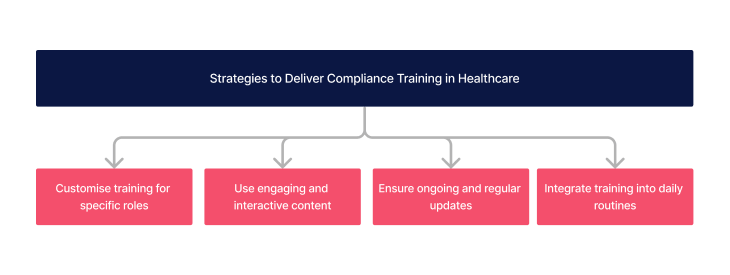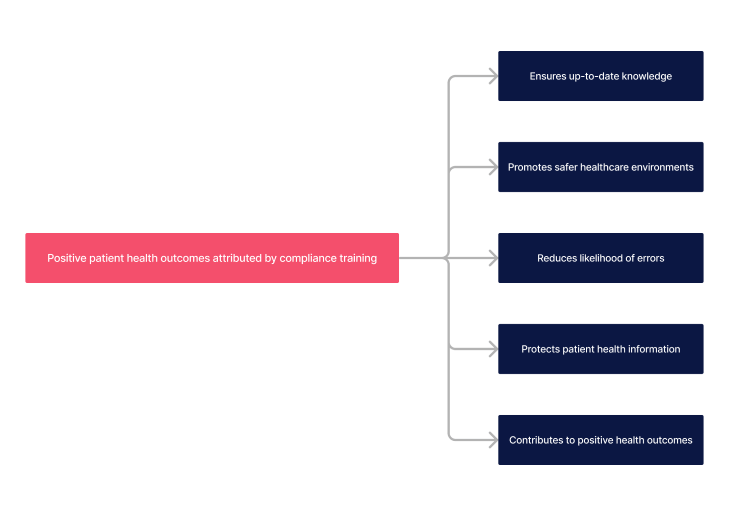What Are the Best Ways to Deliver Compliance Training?
What is Compliance Training?
Compliance training is an educational process that ensures health professionals, allied health, and other staff in the healthcare system understand and are able to adhere to relevant laws, policies, and regulations. It's designed to mitigate risk, enhance patient care quality, and ensure a safe and legal practice environment.
Examples of Compliance Training in Healthcare
Examples include training on patient privacy and data security in line with health information regulations, understanding health insurance claims processes, and adhering to public health mandates. Other areas cover mental health protocols, infection control, and safety measures in aged care and primary care settings.
Why is Compliance Training Important?
Compliance training is crucial as it empowers healthcare professionals with the knowledge and skills to perform their duties within legal and ethical boundaries, significantly reducing the risk of malpractice and enhancing patient trust. By systematically addressing compliance, it fosters a culture of accountability and transparency across healthcare settings, from primary care to aged care and mental health services. This comprehensive approach not only minimises financial liabilities due to non-compliance but also contributes to a more informed, confident, and competent workforce. Through continuous education on the latest regulations and best practices, compliance training ensures that healthcare providers are adept at navigating the complexities of the healthcare system, ultimately leading to improved patient outcomes and reinforcing the public's confidence in the health system's ability to provide safe and effective care.
What is the Best Way to Measure Compliance?
To enhance the measurement of compliance, incorporating a variety of evaluation techniques is critical. Beyond assessments, audits, and feedback mechanisms, utilising performance metrics, such as incident reporting rates and compliance-related issue resolution times, provides a comprehensive view of the effectiveness of compliance training. Engaging health professionals in scenario-based exercises and simulations can further validate the practical application of their knowledge in real-world settings. These methods allow for a deeper understanding of how well individuals and teams can apply compliance principles in their daily operations, thereby fostering a culture of continuous improvement. This multifaceted approach ensures not only knowledge acquisition but also the practical application of compliance protocols in the healthcare environment.
What are the Best Ways to Deliver Compliance Training?
Delivering compliance training effectively involves a blend of traditional and modern educational methods. Online compliance training courses, facilitated through a Learning Management System (LMS), offer flexibility and accessibility. Incorporating interactive modules, real-life case studies, and periodic assessments can enhance engagement and retention.
Strategies to Deliver Compliance Training in Healthcare

The following strategies listed below provide a comprehensive approach to delivering effective compliance training in healthcare, ensuring that training is relevant, engaging, and up-to-date with current standards and regulations.
- Customize Training for Specific Roles: Develop compliance training programs tailored to the unique responsibilities and challenges of different roles within the healthcare system. This ensures that each professional receives relevant, role-specific knowledge and skills.
- Use Engaging and Interactive Content: Incorporate interactive elements such as simulations, quizzes, and scenario-based learning into compliance training. This approach helps to engage learners, making the training more memorable and effective.
- Ensure Ongoing and Regular Updates: Compliance regulations and best practices evolve constantly. Regularly update training content and provide ongoing learning opportunities to keep health professionals informed about the latest compliance standards.
- Integrate Training into Daily Routines: Embed compliance training into the everyday activities of healthcare professionals through microlearning—short, focused training modules—and just-in-time training techniques that offer learning opportunities at the point of need.
Want a healthcare LMS that can support learning plans around delivering compliance training?
Contact Ausmed today and see how we can support your organisation!
Benefits and Negatives of Compliance Training in Healthcare
This table below outlines the key benefits and negatives of compliance training in healthcare, highlighting its impact on patient care quality, legal compliance, and organizational culture, as well as the challenges associated with developing and delivering effective training..
| Benefits | Negatives |
|---|---|
| Enhances the quality of patient care by ensuring health professionals are knowledgeable about the latest standards and practices. | Can be time-consuming and require significant resources to develop, update, and deliver training effectively. |
| Reduces legal and financial risks by helping healthcare organisations comply with laws and regulations. | One-size-fits-all training may not address the specific needs or challenges of different roles within the healthcare system. |
| Improves healthcare outcomes by promoting safe and effective patient care practices. | If not engaging, compliance training can lead to learner disengagement and poor retention of information. |
| Supports a culture of continuous improvement and professional development within healthcare organisations. | Ongoing and regular updates to training content can be challenging to maintain over time |
| Helps protect patient health information and ensures privacy and security practices are followed | Integrating training into daily routines requires careful planning and may disrupt workflow if not implemented effectively |
How Does Compliance Training Deliver Positive Health Outcomes to Patients?

Compliance training ensures that health professionals are well-versed in the latest protocols and procedures, directly impacting patient care. It leads to safer healthcare environments, reduces the likelihood of errors, and ensures the protection of patient health information, all contributing to positive health outcomes.
Positive patient outcomes include:
- Ensures Up-to-Date Knowledge: Compliance training keeps health professionals informed about the latest protocols and procedures, directly enhancing the quality of patient care.
- Promotes Safer Healthcare Environments: By adhering to established safety and quality standards, compliance training contributes to creating safer environments for both patients and healthcare providers.
- Reduces the Likelihood of Errors: Through comprehensive education on best practices and legal standards, compliance training minimizes the chances of mistakes that can negatively affect patient health.
- Protects Patient Health Information: Training in data security and privacy laws ensures that health professionals understand how to safeguard patient information, maintaining trust and confidentiality.
- Contributes to Positive Health Outcomes: By improving care quality, enhancing safety, and reducing errors, compliance training plays a crucial role in achieving better health outcomes for patients.
Related Resources
- LMS in Healthcare: The Roles, Benefits and Pros and Cons
- What Are Learning Analytics?
- A Step-by-Step Guide to Data Collection for Learning Analytics
- What Are the Key Learning Analytics Metrics?
- How to Create a Culture of Continuous Learning
- Guide to Compliance Training (for Healthcare Managers)
- How to Manage an Effective Staff Training Program
- Identifying Skills Gaps with Learning Analytics
- A Guide to Personalised Learning in Healthcare
Conclusion
In summary, the delivery of effective compliance training in healthcare is crucial for maintaining high standards of patient care, adhering to legal requirements, and fostering a culture of continuous improvement. By leveraging modern technologies such as online courses and LMS platforms, healthcare organizations can provide engaging and effective compliance training that meets the needs of a diverse workforce.
References
Australian Commission on Safety and Quality in Health Care (2023). Guidelines for Compliance Training in Healthcare. Available at: https://www.safetyandquality.gov.au/ [Accessed 20 February 2024].
Department of Health (2022). Health Information Compliance Standards. Available at: https://www.health.gov.au/ [Accessed 20 February 2024].
Office of the Australian Information Commissioner (2023). Privacy and Health Information. Available at: https://www.oaic.gov.au/ [Accessed 20 February 2024].



